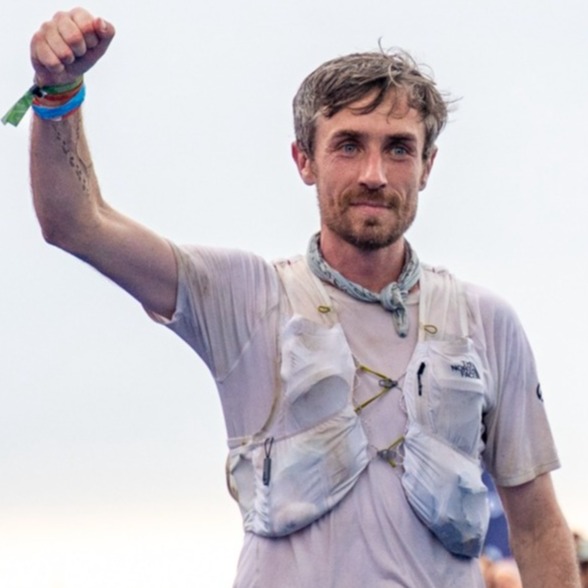
Paddy O'Leary
Hikuri 100km
Paddy's headline numbers
Paddy's strategy
Fueling
Carbohydrate is the main fuel you burn when racing. Failing to fuel properly is a leading cause of underperformance in longer races.
In preparation for this race, Paddy worked hard to train his gut to tolerate a higher carb intake, having experienced issues in prior events of a similar length. While his fuel sources included a few PF 90 Gels and PF 30 Caffeine Gels, Paddy opted to rely heavily on Carb & Electrolyte Drink Mix, which he carried in small plastic bags to mix in soft flasks with water from each checkpoint. We were glad to hear he had good energy levels around six hours in, which has traditionally been the point where he he has experienced significant and debilitating GI issues. He described feeling lethargic in the final two to three hours of the race, unsurprising given he was sick several times during this period. Interestingly though, he was still able to continue to consume gels in the last couple of hours which certainly helped him sustain his effort in the final section and secure 3rd place overall.
Hydration
Taking on board an appropriate amount of fluid and sodium is essential to maintaining blood volume and supporting the cardiovascular effort needed to perform on race day.
Whilst the absolute amount of sodium and fluid consumed per hour is important, it’s critical to consider these in relation to each other. This is known as 'relative sodium concentration' and it’s expressed in milligrams per litre (mg/L). How much sodium you’re taking in per litre of fluid is more important than the absolute amount taken in per hour.
Sweat sodium concentration (mg/L) is largely genetically determined and remains relatively stable. Knowing how salty your sweat is enables you to replace a good proportion of your sweat losses, which can range from 200-2,000mg/L.
Whilst Paddy’s losses are on the moderate side, getting his hydration strategy right is still crucial when it’s hot and/or humid as his higher sweat rate in these conditions can result in significant net losses over the duration of a race.
Learn moreRace hydration: Paddy completed some sweat rate testing in the weeks leading into the event, and having already tested his sweat sodium concentration, we could make an informed estimate of both his fluid and sodium requirements for the race. Paddy relied on a straightforward strategy of Carb & Electrolyte Drink Mix and plain water at checkpoints, supplementing with Electrolyte Capsules in an attempt to match his relative sodium intake as closely as possible to his losses. Unfortunately, ~12 Electrolyte Capsules burst in the plastic bag that Paddy was carrying them in, which resulted in his relative sodium intake only being around two-thirds of his requirements. Paddy already struggled to consume the 14 capsules he did have left, and so whether he would have been able to consume more - even if he did have them available - is unknown.
Dealing with the heat: The humidity, rather than extreme air temperatures, was a key factor in this event, and to prepare, Paddy underwent a period of heat acclimation involving saunas and hot baths following training sessions. This would have increased his blood plasma volume, which would subsequently increase the available pool of fluid to lose as sweat, and reduce the rise in heart rate in warm, humid conditions. On top of this, Paddy was intentional in using ice to cool himself at every aid station and also dunked his head regularly (~15 occasions) in streams and rivers on the course. While this may only have had a transient and marginal effect on core temperature, it will have reduced his fluid requirements by providing fluid onto the skin surface in place of sweat. It’s also a helpful strategy for psychological relief from the heat and humidity, and it’s something we have seen other athletes doing to good effect in equally tough environments.
Caffeine
Beyond the Three Levers of Performance (carb, sodium and fluid), caffeine is one of only a few substances that is proven to improve performance for most endurance athletes as it can help stave off mental and physical fatigue.
Paddy’s caffeine intake fell in line with the recommendations although he did miss taking one PF 30 Caffeine Gel at around the 7 hour mark, partly as a result of the the sickness he experienced.
How Paddy hit his numbers
Here's everything that Paddy ate and drank on the day...
Paddy's weapons of choice
Final thoughts
Paddy's full stats
Data Confidence?
There is an adequate level of accuracy in the data collected and the numbers reported. The athlete manages to recall what they ate and drank including most specifics (brands flavours quantities plausible estimations of volumes). However there are estimations made within the data which affect the overall confidence level in the data reported.